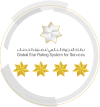Health guidelines during hajj
Maintaining healthy behaviors is essential to perform the Hajj rituals safely.
Download Hajj Health Awareness GuideHealthy Pilgrimage
Hajj is a spiritually rewarding unique experience. At the same time, it is important for pilgrims to balance the physical and mental demands during the season as they brave the heat, physical exertion, and large crowds. This page provides essential health and safety guidelines at every stage of the Hajj journey.
Recommendations before Hajj
-
Visit the doctor before travelling to review your health status.
-
Take the required medications based on the doctor’s advice.
-
Carry your medical report regarding any medical condition you have (diseases, medications and dosages).
-
Take vaccines 15 days before the travelling date to ensure its effectiveness.
-
Engage in physical activity at least three weeks before you travel to improve your fitness.
-
Follow a healthy diet to boost your immune system.
-
Prepare a medical/first aid kit that includes dressings, plasters, small bandages, antiseptic lotion/cream, adhesive tape, blister dressings, sun burn lotion, antihistamine cream, analgesics for pain and fever, and face masks.
-
Make sure you carry a copper bottle to keep water cool. Take an umbrella (preferably light-coloured) to protect against the heat and the sun.
-
Make sure to pack necessary personal items such as towels, toothbrush, toothpaste etc
Managing fatigue during Hajj
Many pilgrims experience heat exhaustion or heatstroke as a result of standing and walking for a long period of time in the sun when the temperature is high.
Symptoms
- Headache
- Dizziness and vertigo
- Dryness and redness of the skin
- Muscle fatigue
- Nausea and vomiting
- Tachycardia
- Difficulty in swallowing and breathing
- Unconsciousness
How to avoid
- Avoid direct exposure to sun
- Use light-colored umbrellas.
- Drink enough water to replace lost fluids
- Sit in shade and cool areas
- Get enough sleep and rest
- Do not rush to perform the rituals of Hajj to avoid fatigue
Health nutrition during Hajj
- Do not buy uncovered foods.
- Wash fruits and vegetables well before eating them.
- Check the food expiration date before eating it and read the labels to know their contents and nutritional value.
- Wash your hands with soap and water before eating.
- Do not store cooked food at room temperature for more than two hours as this leads to bacterial growth which increases the possibility of food poisoning.
- Eat meals regularly to maintain your energy levels and avoid fatigue.
- Do not consume large quantities of energy-boosting drinks such as coffee and tea as they cause dehydration and extreme thirst.
Prevention of infection during Hajj
Pilgrims performing the Hajj are at risk of various health problems due to the large number of people. It is essential to follow a healthy routine during Hajj.
Download Hajj Health Awareness GuidePrecautions
Avoid direct exposure to sunlight, use sunscreen, stay in a shaded area and use an umbrella. Drink plenty of water and fluids to replace lost sweat
Stay away from anyone showing symptoms of infections or skin rashes, and inform the concerned authorities.
Refrain from touching your nose, mouth and eyes, and adhere to cough and sneeze etiquette.
Consider wearing masks when in a crowd to stay away from respiratory infections.
Ensure the safety and cleanliness of the food consumed to prevent gastrointestinal infections.
Wash or sanitise your hands frequently, especially after touching surfaces, using the washroom and before eating.
First Aid during Hajj
Keep your first aid kit ready before the day of sacrifice in case emergency situations arise. It's important to include certain items in your first aid kit, like:
- Cold and fever medicines
- Antiseptics, antipyretics, pain relievers
- Headache medications
- Muscle spasm medications
- Ointments for insect stings, abrasions, and sunburn
- Allergy medications
- Masks
- Medical adhesive
- Thermometer, BP monitors and glucometer
After Hajj
After returning from Hajj get enough rest, drink plenty of fluids. If you develop fever and cough that interfere with your daily activities during the first two weeks after your return, it is recommended to do the following:
-
Take enough rest and drink plenty of fluids.
-
If you develop fever or cough (severe enough to interfere with usual daily activities) during the two weeks after your return, follow the below guidelines:
-
Seek medical help.
-
Cover your mouth and nose with a tissue when coughing or sneezing.
-
Wash your hands regularly.
-
Avoid close contacts with others to avoid infecting them.



Social media share
If you like the content you can share it via